Helena Smrcek's Blog, page 2
March 24, 2025
What Inspired Melanie Stevenson to Write “Where My Heart Belongs”?


When inspiration strikes, it often does so in the most unexpected places. For award-winning author Melanie Stevenson, the idea for her novella Where My Heart Belongs���part of the I���ll Be Home Christmas anthology���was born on a road trip with her writer friends, affectionately known as the Fab Four. Returning from a writer���s conference, they toyed with the idea of writing an anthology together. Since Melanie had just completed a rom-com manuscript, it was a natural choice to continue in the same genre. Each author selected a Canadian setting, and Melanie chose the charming city of Quebec. One morning, as she awoke, the first line of the story came to her. She grabbed her phone, started typing, and three hours later, she had the foundation of a heartwarming Christmas tale.
A Journey Through WordsMelanie Stevenson is a gifted storyteller who seamlessly blends humor, depth, and faith in her writing. Born in England, Melanie immigrated to Canada at the age of five, settling in Southern Ontario. Her love for British tea and gardens remains a cherished part of her identity. As a child, she was captivated by books, art, and storytelling, penning her first novel at the age of twelve. She later pursued her passion for literature and the arts at the University of Waterloo, earning a Bachelor of Fine Arts.
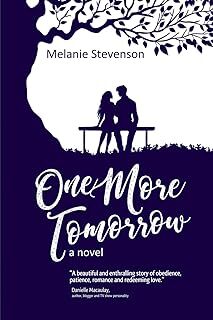
Since becoming a Christian at eighteen, Melanie has poured her faith into her writing. Her debut novel, One More Tomorrow, was inspired by years of journaling her prayers and reflections. This novel, which had its first line conceived in an airport terminal, won Best Romance at the 2020 Word Guild Awards. That same year, she was honored as Best New Canadian Author. Her second book, Soul Focus ��� Trials, a collection of devotionals, was released in November 2019. Where My Heart Belongs is her first novella, released in November 2024 as part of the I���ll Be Home anthology���a heartwarming Christmas collaboration.
Writing Process & Creative RitualsLike many writers, Melanie���s ideas often emerge during the most mundane moments���while driving, cooking, or even folding laundry. Knowing that inspiration can be fleeting, she keeps a notebook handy or records her thoughts on her phone. A snippet of dialogue, a single sentence, or an intriguing scene is enough to set the creative wheels in motion. By the time she sits down to write, she already has a sense of where the story is headed. However, she allows room for spontaneity, letting her characters steer the narrative in unexpected directions. Even on uninspired days, Melanie commits to sitting at her desk���trusting that the words will come.
The Joy of Storytelling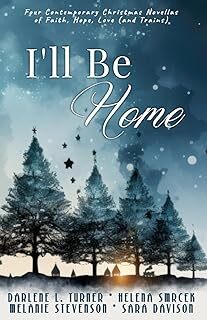
For Melanie, one of the most rewarding aspects of writing is connecting with readers. The response to Where My Heart Belongs has been particularly touching. Several readers reached out to share that her story made them both laugh and cry���a testament to the emotional depth she infuses into her work. Knowing that her words bring joy and warmth to others is what makes the writing journey worthwhile.
In addition to her writing, Melanie is a talented abstract painter, working with acrylics and oils. Her love for the arts extends to theatre, where she has spent over twenty-five years writing, directing, and teaching acting classes for both young people and adults.
Family & FaithMelanie and her husband, Ralph, are proud parents to four amazing children: Kurtis, Konnor, Elanna, and Keira. For eighteen years, Melanie homeschooled her children, passing on her love of the arts and nurturing their creativity. She is deeply passionate about sharing the healing love of Jesus and championing others in their faith journey through both the written and spoken word.
For those who love engaging stories with heart, humor, and faith, Melanie���s work is a must-read. Stay connected with her writing journey by visiting her website www.melaniestevenson.com and subscribing to her newsletter at https://scentofheaven.me/subscribe/.
The post What Inspired Melanie Stevenson to Write “Where My Heart Belongs”? appeared first on Helena Smrcek.
March 17, 2025
Why I Write Romantic Suspense: A Conversation with Sara Davison


Sara Davison never intentionally set out to write romantic suspense, but when she began seriously writing fifteen years ago, that���s exactly what emerged. As a lifelong fan of the genre, she���s always been drawn to the adrenaline-pumping thrill of suspense paired with the deep emotional stakes of romance. The combination keeps readers on the edge of their seats, not only wondering if the hero and heroine will survive but also if they will overcome the obstacles between them to find love.
Davison points to classic films such as Gone with the Wind and Casablanca to illustrate the power of romance in storytelling. While the plots would still be intriguing without the love stories, it���s the self-sacrificing love, the unspoken longing, and the moments of heartbreak that make these stories unforgettable. Similarly, in The Sound of Music, the romance between Maria and Captain von Trapp elevates the film beyond a charming tale of a governess and her mischievous charges.
This blend of love and danger is a key element in Davison���s own writing. Adding romance into suspense novels increases the stakes, making the threats more personal and the emotional tension more gripping. If the protagonist stands to lose not just their life but the person they love most, every scene becomes more intense, and the reader is even more invested in the outcome.
Beyond storytelling mechanics, Davison sees love stories as a reflection of a deeper spiritual truth. In the Song of Solomon, human love mirrors the divine love between God and humanity. While imperfect and flawed, romantic love serves as a reminder that we are the bride of Christ, chosen and cherished by the One who gave everything for us.
Catch Her Next Release – Coming May 2, 2025 Pre-order now!A Message from Sara (and a freebie)
Pre-order now!A Message from Sara (and a freebie)God never promised that life would be easy, but He did promise that He would never leave us or forsake us. No matter what trials we face, He is always with us.
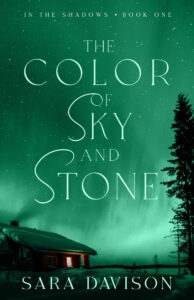
Recently, I���ve had the heartbreaking privilege of walking alongside two close friends whose marriages were ending. Neither had ever imagined they would face divorce, yet due to devastating breaches of trust and unrepentant hearts, they found themselves with no other recourse. In those moments of pain and loss, I reminded them that God is still good. Even when answers don���t come, He is sovereign, in control, and able to redeem even the darkest circumstances for His glory.
As C.S. Lewis so beautifully wrote, ���I know now, Lord, why you utter no answer. You are yourself the answer. Before your face, questions die away. What other answer would suffice?���
Often, we don���t receive the answers we seek. But we can trust that God���s heart aches alongside ours and that one day, He will set all things right. No matter what struggles you are facing today, you are never alone.
Get your free story here.
About Sara DavisonSara Davison is the award-winning author of numerous romantic suspense novels, including The Watcher and the Night Guardians series. Her books have been finalists for over a dozen national writing awards, including the Christy Award, and she has won the Carol Award twice for romantic suspense. She is also a recipient of the Holt Medallion and Cascade Awards.
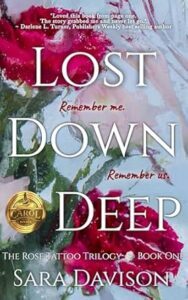
Sara���s novels are known for their intense, thought-provoking themes, strong faith elements, and touches of humor that bring relief from the tension. She is committed to writing stories that are not only excellent but also meaningful, tackling complex topics with sensitivity and grace. Every story is covered in prayer, with the hope that it will encourage and inspire readers in their own journeys.
A proud Canadian, Sara lives in Ontario with her husband, Michael. When she���s not writing, she enjoys coffee, hockey, poutine, and apologizing unnecessarily���because, after all, she is Canadian.
Q & A with Sara DavisonWhat Inspired Me to Write My Latest Book?
Every story I write begins as a spark���sometimes from history, a fleeting moment, or an unexpected question that won���t let go. My latest novel was born from a deep fascination with forgotten WWII heroes and the lasting impact of their choices. As I researched, I found myself drawn to the untold sacrifices of Czech RAF pilots, men who risked everything yet were often overlooked in history. Their courage, resilience, and the cost of war shaped my characters and the dual timeline structure of the book.
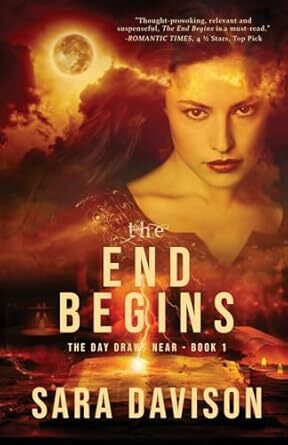
Yet, beyond the historical intrigue, I was also inspired by a more personal journey���a reflection on identity, love, and faith. The story explores what happens when our past refuses to stay buried and how searching for truth can lead to unexpected redemption.
What Do I Hope Readers Will Take Away?
While each of my books has a unique theme, one truth runs through them all: we are never alone. No matter what we have been through, what we might have done, or what has been done to us, God sees us, knows us, and has promised to never leave us or forsake us. Through my writing, I pray readers will be reminded of this hope, carrying it with them long after they turn the final page.
Themes of faith, forgiveness, and rediscovering love are central to this novel. I hope readers connect with the characters��� struggles and triumphs, seeing echoes of their own journey in the pages.
My Writing Process & Creative Rituals
I don���t do extensive character planning before I begin writing. Instead, I allow them to reveal themselves to me through their actions, dialogue, and relationships. I rarely know their backstories or deepest wounds at the start���but through the process, they take shape, becoming as real as any living person. My husband likes to say that he sees himself in every hero I write, and perhaps he���s right.
I find the writing process exhilarating, but my true love is editing. Refining a manuscript, discovering deeper layers, and shaping the story into its best form is incredibly rewarding.
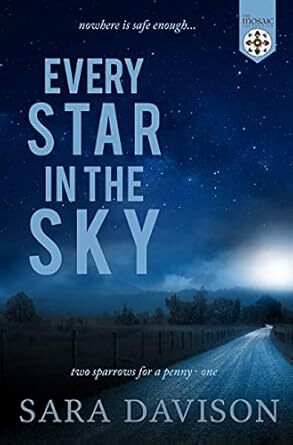
Authors & Stories That Have Influenced Me
As a lifelong fan of historical fiction and romantic suspense, I���ve been deeply influenced by both classic literature and modern storytelling. Films like Gone with the Wind, Casablanca, and The Sound of Music have shown me the power of romance in storytelling. While the plots would still be engaging without love stories, it���s the self-sacrificing love, the longing, and the heartbreak that make them unforgettable. I strive to bring that same depth of emotion to my work.
Creating Characters That Feel Real
My characters develop organically. I let them evolve naturally, showing me who they are as the story unfolds. Their flaws, struggles, and faith journeys often surprise me as much as they do my readers. I want them to feel authentic���people who could step off the page and into real life.
The Most Rewarding Part of My Writing Journey
One of the greatest surprises in my writing career has been the joy of being part of the Christian writing community. From the beginning, I have been surrounded by fellow authors who understand that we are not in competition but on the same team, working to glorify God through our words. This uplifting and encouraging network has become a source of deep friendships and constant inspiration. I am grateful every day to be part of it.
Writing stories that blend history, faith, and romance has been an incredible adventure. I can���t wait to see where the next story takes me���and my readers.
The post Why I Write Romantic Suspense: A Conversation with Sara Davison appeared first on Helena Smrcek.
March 10, 2025
Celebrating Laura Scott: A Lifetime of Faith, Family, and Suspenseful Stories


When asked when she began writing, Laura Scott���s answer is as timeless as her stories: ���I can���t remember when I wasn���t writing.��� Like many authors, Laura���s love for storytelling began in childhood. An avid reader, she eventually ran out of books she loved and started crafting her own tales. At thirteen, she completed her first teen novel, and by seventeen, she���d penned her first romance. Though those early manuscripts never saw the light of day, they were the seeds of a career that would blossom into more than 65 published novels.
After completing Graduate school, Laura took a moment to reclaim her passion for writing, and she���s never looked back. Drawing inspiration from faith-based authors like Grace Livingston Hill, she found her home with Harlequin Love Inspired Suspense and began building a world filled with thrilling plots, deep faith, and engaging characters. Her stories, including beloved series such as Crystal Lake, Lifeline Air Rescue, The McNallys, Security Specialists, Inc., Smoky Mountain Secrets, Called to Protect, and Finnegan First Responders, captivate readers around the world.
[image error]A Heart for Family and PetsLaura���s journey from registered nurse to full-time author is nothing short of inspiring. She continues to blend her real-world experiences with her storytelling, creating authentic, pulse-pounding suspense. Her dedication to her craft was recognized in 2017 when she received the Wisconsin Romance Writers Lifetime Achievement Award, a testament to her impact on the genre and her peers.
Living in Milwaukee, Wisconsin, with her husband of 37 years, Laura cherishes her family. Her daughter Nicole and son-in-law Mike are thriving, and her son Jonathan is a Registered Nurse at the same hospital where Laura once worked. She counts herself blessed by this close-knit family.
A dog lover at heart, Laura���s stories often include furry friends. Though she still misses her Westie, Mac, Laura finds joy in dog sitting for her siblings. Her love for pets shines through in her books, adding warmth and charm to her suspenseful tales.
 Exciting News: Upcoming Anthology Release!
Exciting News: Upcoming Anthology Release!We are thrilled to announce that Laura Scott is contributing to the highly anticipated romantic suspense anthology Long Hot Summer, published by Two Dogs Publishing. Her story will be part of the second volume titled Valor, releasing on May 23, 2025. Laura joins fellow authors Kari Trumbo, Jessica Ashley, and Helena Smrcek in bringing readers a captivating blend of romance and suspense. Stay tuned for more details as we get closer to the release date!
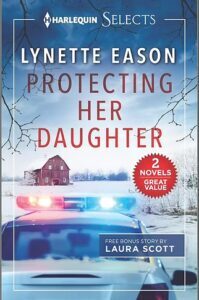 Free Book Giveaway & A Special Treat
Free Book Giveaway & A Special TreatThis month, Laura Scott is offering a free print book to a lucky winner! Be sure to enter the giveaway at Laura Scott���s Contest Page.
And if you���re looking for a fantastic read, check out Protecting Her Daughter by Lynette Eason, featuring a bonus story by Laura Scott! When single mom Zoe Collier���s daughter is targeted for abduction, she flees to a remote ranch. With the help of local vet Aaron Starke, Zoe must unravel the mystery before it���s too late. It���s a thrilling blend of danger, faith, and love���everything you���d expect from these talented authors.
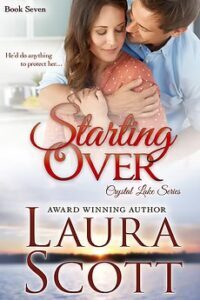 Stay Connected!
Stay Connected!To keep up with Laura���s latest releases, special updates, and more, join her monthly newsletter. Subscribers receive a free ebook copy of Starting Over as a thank you! If you���re using Gmail, don���t forget to check the Promotions tab or your Spam folder if you don���t see it right away.
The post Celebrating Laura Scott: A Lifetime of Faith, Family, and Suspenseful Stories appeared first on Helena Smrcek.
March 3, 2025
Meet Elle E. Kay: The Queen of Christian Romantic Suspense


If you���re a fan of heart-pounding suspense woven with the warmth of heartfelt romance, then Elle E. Kay���s novels should be at the top of your reading list. Elle, an Angel Award-winning Christian fiction author, has captivated readers with her gripping stories set against the charming backdrops of rural Pennsylvania. Her most recent release, Midnight Offensive, is part of the Silent Night anthology, and it promises to keep you turning pages well past midnight!
Stories with Heart and ThrillsElle���s stories aren���t just about love and adventure���they���re rich with themes of grace, forgiveness, and faith. Her Pennsylvania Parks series and Endless Mountain series offer a blend of suspense and romance that is nothing short of masterful. Her novels Grave Secrets and Grave Consequences from the Pennsylvania Parks series were even recognized by the Angel Book Awards, with top honors in the Mystery/Suspense category.
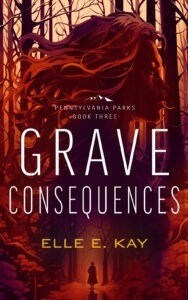 A Creative Spirit with a Faithful Heart
A Creative Spirit with a Faithful HeartElle���s journey as an author is as inspiring as her characters’ stories. She began with non-fiction, poetry, and children���s books before debuting in Christian fiction with Shadowing Stella in 2016. Since then, her career has been a whirlwind of exciting projects, including the Lawkeeper series, the Heroes of Freedom Ridge series, and the upcoming Corralling the Cowboy, set to release on December 18th as part of the Christmas in Redemption Ridge series.
More Than Just a WriterWhen she���s not crafting her next thrilling novel, Elle can be found on her hobby farm in Central Pennsylvania, where she lives with her husband, three dogs, and a delightful array of farm animals. She also shares her passion for Jesus through music and actively participates in her church���s youth ministry. Her multifaceted life brings depth and authenticity to her storytelling, making each book a unique and immersive experience.
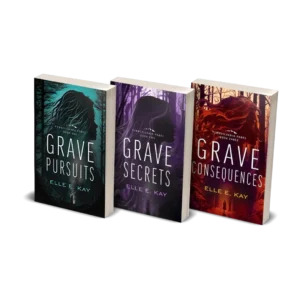 The Writing Journey
The Writing JourneyElle���s creative process might surprise you. She describes herself as a ���binge writer,��� allowing creativity to flow in concentrated bursts. She���s also a graphic designer, pianist, and singer, balancing her artistic passions in a way that keeps her storytelling fresh and inspired. Elle believes that variety in creative outlets helps restore her imagination, contributing to the depth and vibrancy of her novels.
Q&A with Elle E. KayWhat do you hope readers will take away from your book? Are there specific themes or messages that are close to your heart?
“All of my books have underlying themes, though often unplanned. Many reflect grace and forgiveness, but the truth is, no book will hit two different people in the exact same way. I believe God gives us what we need to receive from whatever we���re reading (as long as it���s God-honoring). I only hope that my book draws readers closer to Him.”
Your characters feel so real. How do you go about creating and developing them? Are any based on people you know?
“While I���ve never based a character on someone I know, I did base some of my characters��� backstories on my own history, so when they talk about their past it may reflect people in my own life due to the similarity. Yet, the characters that appear in my novels have come purely from imagination. Composites of different people I���ve known may be reflected in my characters as they���ve influenced me, so it���s only natural they would find their way into my books in bits and pieces.”
Can you share a bit about your writing process? Do you have any rituals or routines that help you stay creative?
“To be honest, my writing is a bit scattered. I want to be the person who sits down and writes two thousand words every day, but I���m not. I binge write. I���m also a graphic designer, and I binge design. I���ll spend days or even weeks designing new pre-made covers, then I���ll quit working on anything new for months at a time. I also play piano, and I binge play. I���ll go months without playing, and then I���ll feel the need to play every day. Same with singing. I try to be more disciplined, and sometimes it works for a while, but then I fall back into old habits. Yet, I���m not sure it���s a bad thing to bounce between endeavors. I believe the variety of artistic outlets helps restore my creative juices, so I come back to my writing refreshed.”
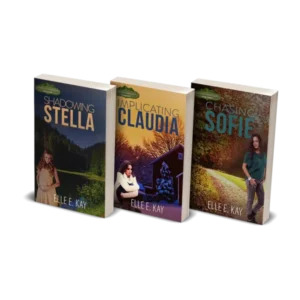 Want More? Join Elle���s VIP Reader Club
Want More? Join Elle���s VIP Reader ClubFor readers who want to dive deeper into Elle���s world, joining her VIP Reader Club offers a special treat. New members receive a complimentary digital copy of Shadowing Stella and gain access to exclusive sales, freebies, and first looks at her upcoming releases. It���s as easy as visiting elleekay.com and signing up. You can also grab your freebie by clicking this link: Free Book.
How to connect with Elle E. Kay? Elle loves connecting with her readers! You can find her on social media:
Twitter: @ElleEKay777Instagram: @elleekay7Facebook: Elle E. KayBe sure to follow her to stay updated on her latest releases, get behind-the-scenes peeks, and engage with a community of fellow book lovers!
Get Ready for More AdventuresWith every new book, Elle E. Kay invites readers on a journey filled with suspense, love, and God���s grace. Midnight Offensive is just the latest chapter in her incredible storytelling journey, and there are more thrilling tales to come. Whether you are a longtime fan or new to her work, Elle���s books offer a perfect escape into stories that not only entertain but also uplift and inspire. Stay tuned, because you never know what page-turning adventure is coming next!
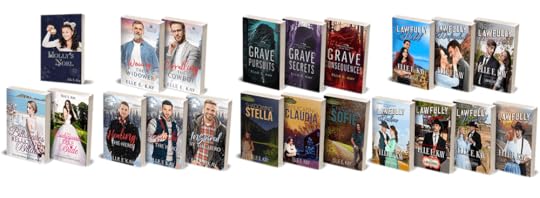
Disclaimer: Some of the links in this newsletter may be affiliate links, which means I earn a small commission���at no extra cost to you���if you make a purchase. Think of it as contributing to my coffee fund so I can keep writing great stories for you! 
 Thank you for your support!
Thank you for your support!
The post Meet Elle E. Kay: The Queen of Christian Romantic Suspense appeared first on Helena Smrcek.
August 20, 2024
10 Expert Tips on How to Start a Book Club That Thrives

Consider starting a book club to meet fellow book lovers and encourage yourself to read more.
Decide on a theme for your book club, such as reading only local authors.
Set an intention for your own book club, such as relaxed or in-depth discussions.
Use social media to connect with fellow book lovers and invite them to join your club.
Invite close friends and acquaintances to join your book club.
Consider using Meetup.com or Facebook groups to find book club members.
Decide who you want to invite to your book club, including close friends and acquaintances.
Consider the size of your book club and how it will affect meeting logistics.
Use online platforms, such as Bookclubs, to create your club, invite members, schedule meetings, and facilitate discussions.

Most clubs meet every month or two.
Some clubs schedule meetings months in advance, while others confirm meet-dates on the fly.
After a few meetings, you’ll know what works best for your crowd.
Book clubs usually meet in members’ homes, but you can also meet at a local library, café, or wine bar.
Consider hosting virtual meetings using online platforms like Google Meet or Zoom.
Choose a location that’s conducive to conversations and consider calling the location ahead of time to ensure they have space for your group.
Decide how you will choose books for your book club, such as through a formal voting process or group discussion.
Consider the theme of your book club and how it will affect book choices.
You can use online resources, such as NoveList, to find book recommendations.

Set ground rules from the beginning around participation, attendance, book votes, potluck rules, or whatever else applies to your specific book club.
Having guidelines will help everyone know what to expect and allow you to relax and enjoy book club.
Consider how many members your club will have and how you will pick your books.
Choose books that are thought-provoking and open to interpretation.
Consider books that have been popular among book clubs or have won literary awards.
You can use Bookclubs’ polling feature to let members vote on books.

Use discussion questions from the back of the book or search for them online.
You can also make up your own list or have each member bring a question or two about the book.
Consider using online resources, such as discussion guides, to help facilitate the discussion.
Plan the discussion for your book club meeting, including guiding questions and topics.
Consider using a book club discussion guide or making a plan to keep people chatting.
Make sure to leave time for members to share their thoughts and opinions.
Nominate a member to start the meeting with an open-ended question or report on book reviews.
Use Bookclubs’ discussion guide or general book club questions to facilitate discussions.
Encourage respectful and open-minded discussion among club members.

Stay organized to keep your momentum rolling.
Use Bookclubs to manage book choices and meeting dates.
Enlist members to share the organizing and hosting duties.
Find your groove and have fun with your book club.
Use Bookclubs to rate books and share opinions.
Consider hosting themed meetings or outings to make your book club more enjoyable.
Decide how you’ll divide your time between books and socializing.
Consider how you’ll handle plot-spoilers during discussions.
You can use Bookclubs’ discussion guide or general book club questions to facilitate discussions.

Book clubs provide a wonderful opportunity to connect with others who share a passion for reading, engage in lively book discussions together, and explore diverse perspectives through literature. Whether you're looking to start a book club with friends, colleagues, or fellow enthusiasts in your community, this guide offers practical steps and tips to help you embark on a rewarding journey of literary exploration and camaraderie.
Before diving into logistics, take time to clarify the purpose and goals of your book club. Consider what kind of books you want to read (fiction, non-fiction, specific genres), the frequency of meetings (monthly, bi-monthly), and the format of discussions (casual chats, structured questions). Establishing clear goals will help guide your book selection process and ensure that fellow book club members are aligned in their expectations and interests.
Reach out to friends, family, colleagues, and acquaintances who share your enthusiasm for reading or who may be interested in joining a book club. You may find members can also use social media platforms, local community boards, or online forums to recruit members who may be looking to connect over books. Aim for a manageable group size that allows for meaningful discussions while accommodating diverse schedules and preferences.

Selecting your first book is an exciting opportunity to set the tone for your new book club. Consider books that appeal to a broad audience or align with the interests and preferences of your members. Engage members in the decision-making process by creating a shortlist of book options and voting on the first read. Once you've chosen a book, set a date, time, and location for your first meeting. Whether meeting in person or virtually, ensure that everyone has access to the chosen book and understands the expectations for the discussion.
Establishing meeting guidelines and a discussion format helps create a more structured discussion, and inclusive environment for your book club. Decide on guidelines for respectful listening, participation, and time management during discussions. Consider using discussion guides, prepared questions, or rotating moderators to facilitate conversations and ensure that everyone has an opportunity to share their thoughts. Encourage members to engage critically with the book while respecting diverse interpretations and perspectives.

Beyond discussing books, book clubs thrive on fostering engagement and building community among members. Consider incorporating social activities, themed meetings, or literary-themed events to enhance camaraderie and deepen relationships. Activities such as author Q&A sessions, book-themed outings, or shared meals inspired by the same book, can enrich the overall experience and create lasting connections among members. Encourage open communication, active participation, and a welcoming atmosphere where members feel valued and supported in their reading journeys.
As your book club evolves, seek feedback from members on meeting formats, book selections, and overall experiences. Regularly evaluate what works well and what could be improved to ensure that your book club continues to meet the needs and interests of its members. Remain flexible and open to trying new ideas, such as themed months, genre rotations, or incorporating multimedia elements into discussions, to keep actual book and meetings engaging and dynamic.

Lastly, consider expanding your book club's reach by inviting new members, collaborating with local libraries or bookstores, or joining online book club platforms to connect with readers beyond your social club or immediate circle. Embrace the journey of exploring diverse literary worlds, engaging in thought-provoking discussions, and forging meaningful connections with fellow book lovers. Remember that the true joy of a book club lies in the shared exploration of stories, ideas, and perspectives that enrich our lives and deepen our appreciation for the power of literature.
Starting a book club is not just about reading books together but about creating a space where members can connect, share experiences, and foster a love of reading that transcends the pages of any single book. By following these steps and embracing the book group spirit of community and curiosity, you can embark on a fulfilling and enriching book club experience that celebrates the transformative magic of books and the bonds they create among readers.
Diversity in virtual book club, selection and inclusivity in discussions are crucial aspects of fostering a vibrant and enriching book club experience. Embrace a wide range of voices, perspectives, and genres in your book choices to reflect the diverse interests and backgrounds of your members. Consider alternating between fiction and non-fiction, exploring different cultures and historical periods, and incorporating works by authors from marginalized or underrepresented groups. This approach not only broadens members' literary horizons but also encourages empathy, understanding, and meaningful conversations about important social issues.

In today's digital age, technology offers valuable tools for enhancing the flexibility and accessibility of your book club. Consider hosting virtual meetings using video conferencing platforms like Zoom or Google Meet to accommodate members who may have busy schedules or live in different locations. Virtual meetings also allow for greater participation from members who prefer the convenience of attending from home. Utilize online book discussion, forums, group chats, or social media groups to facilitate ongoing conversations between meetings, share book recommendations, and engage members in literary discussions beyond the physical or virtual gathering spaces.
To sustain long-term engagement and keep meetings dynamic, incorporate creative activities and themed discussions into your book club agenda. Experiment with themed months dedicated to specific genres, authors, or literary themes, allowing members to explore interconnected works or delve deeper into particular topics of interest. Host book-themed trivia nights, movie screenings based on book adaptations, or author spotlights to add variety and excitement to your meetings. Encouraging members to contribute ideas for activities and themes ensures that everyone feels invested in shaping the next successful book club that's experiences and fosters a sense of ownership and camaraderie among participants.

Whether you're embarking on literary adventures with longtime friends or forging new connections with fellow book enthusiasts, starting a book club is an enriching journey that celebrates the transformative power of storytelling and strengthens bonds through the joy of reading together.
August 1, 2024
Mastering Social Media Content: Engaging Strategies for Authors

In the ever-evolving, digital marketing landscape, social media has become an indispensable tool for authors and literary communities to connect with readers.
Whether you're a seasoned author or an emerging writer, engaging with your audience on social media platforms can help you foster meaningful relationships, build a loyal readership, and create a thriving literary community.
In this blog post, we'll explore the importance of social media engagement and offer practical strategies for effectively connecting with your readers.

Social media engagement goes beyond simply posting content; it's about creating a dialogue and fostering a sense of community among your readers.
Engagement involves interactions such as likes, comments, shares, and direct messages that allow you to connect with your audience on a personal level.
By actively engaging with your readers, you can build trust, increase engagement, encourage loyalty, and create a supportive network that champions your work.
This interaction not only enhances your readers' experience but also provides valuable insights into their preferences and interests, helping you tailor your content and storytelling to better meet their needs.

Not all social media platforms are created equal, and different social platforms attract different types of audiences.
To effectively engage with your readers, it's essential to choose the platforms that align with your target audience and your content style.
For instance, Facebook and Instagram are excellent for sharing longer posts, behind-the-scenes content, and visually appealing images, while Twitter is ideal for quick updates and engaging in real-time conversations.
Pinterest can be a great platform for sharing thematic boards related to your books, and TikTok is perfect for creating short, engaging videos that capture the attention of a younger audience.
By understanding the unique strengths of each platform, you can strategically choose where to focus your efforts for maximum impact.

One of the keys to effective social media engagement is creating content that resonates with your readers.
Content that is informative, entertaining, and relatable will naturally encourage interaction. Share a variety of content types, including sneak peeks of upcoming books, behind-the-scenes looks at your writing process, personal anecdotes, book recommendations, and interactive polls.
Use visuals like images and videos to make your posts more engaging and appealing. Consider hosting live events, such as Q&A sessions or virtual book readings, to interact with your audience in real-time and create a more personal connection.
By offering diverse and engaging content, you can keep your social media audience interested and encourage them to actively participate in the conversation.

Encouraging your readers to interact with your posts is crucial for building user engagement too. Ask open-ended questions that invite comments and discussions, and make an effort to respond to comments and messages to show that you value your readers' input.
Create opportunities for your readers to share their thoughts and experiences, such as asking them to post their reviews, share photos of themselves reading your book, or participate in themed hashtag challenges.
Engaging with user-generated content not only fosters a sense of community but also helps to promote your work to a wider audience through your readers' networks.
The more you encourage and acknowledge reader interaction, the more connected and invested they will feel in your literary journey.
Social media offers a unique opportunity to build a community around your work, where readers can connect with you and with each other.
Create spaces where your readers can engage in discussions, share their thoughts, and support each other, using social listening tools such as Facebook groups or dedicated hashtags on Twitter and Instagram.
By fostering a sense of community, you can create a supportive and interactive environment where readers feel valued and connected.
This community can become a powerful platform for promoting your books, sharing updates, and gathering feedback. It also provides a space for readers to form connections with like-minded individuals, enhancing their overall reading experience and deepening their loyalty to your work.

To continuously improve your social media engagement, it's essential to leverage analytics tools to understand what content resonates most with your audience.
Platforms like Facebook, Instagram, and Twitter offer insights into post performance, audience demographics, and engagement metrics.
By analyzing this data, you can identify trends, determine which types of content generate the most interaction, and adjust your strategy accordingly.
Use this information to refine your content, optimize posting times, and experiment with new formats and topics.
Regularly reviewing your analytics will help you stay attuned to your audience's preferences and ensure that your various social media marketing efforts are effectively supporting your engagement goals.

Finally, the key to successful social media engagement is consistency and authenticity. Regularly posting and engaging with your readers helps to keep your audience interested and connected.
However, it's equally important to be authentic in your interactions. Share your genuine thoughts, experiences, and insights, and approach your audience with sincerity and openness.
Readers can quickly sense when interactions are forced or insincere, so maintaining an authentic and honest social media presence is crucial for building trust and rapport.
By consistently showing up and being your true self, you can cultivate a loyal and engaged readership that feels genuinely connected to you and your work.
Social media engagement is a measure of how people interact with your social media accounts and content.
Engagement is crucial because social media platforms prioritize posts with more active and thoughtful interactions.
Readers expect authors to engage with them, particularly when it comes to providing support, and respond quickly to messages.

Engagement builds relationships and enables authors to build a better readership.
Boosting social media engagement can lead to increased website traffic and improved brand awareness.
Engagement leads to accomplishing larger goals like increased website traffic and improved brand awareness.
Short-form video, images, and live video are often the most engaging types of in-feed social content.
Pay attention to what content performs well on each platform and consider what resonates with your target audience.
Visual content like short-form video and images are more likely to be shared.

Having an authentic voice on social media is important because it humanizes your brand and encourages people to respond positively.
Establishing a brand voice is especially important if multiple people manage your social media accounts.
Different styles work for different audiences, and adding personality with GIFs and emojis can liven up your feed.
Familiarize yourself with the unique algorithms of each platform to know how to boost engagement.
Timing is important, and consider your post timing to strategically post when your followers are most active.
Other actions, such as using Instagram Stories, posting videos on Facebook, and using hashtags on TikTok, can also influence engagement.

Track likes, comments, shares, and click-through rates to measure audience engagement.
Analyze which stories perform the best and learn from them.
Engagement metrics can help you refine your marketing strategy to better match your target audience’s tastes, interests, and expectations.
Each social media platform has its unique strengths and characteristics.
To become a storytelling pro, you need to understand which platforms align best with your content.
Ideal platforms for your brand depend on your target audience and content style.

Schedule smarter to create content that resonates with your audience.
Posting high-quality content that resonates with your audience is key to increasing engagement.
Use analytics to track engagement metrics such as comments, shares, likes, saves, clicks, and direct messages.
Keep response times speedy to build a loyal community of fans.
Responding to comments and messages promptly shows appreciation for your audience’s participation and keeps the conversation going.
Engagement builds relationships and enables brands to build a better product for their users.
Mastering the art of social media engagement is an ongoing journey.
It’s about connecting with your audience on a personal level, sharing your authentic self, and crafting narratives that resonate.
As you continue to refine your storytelling skills, remember that practice, creativity, and adaptability are your allies in this dynamic digital landscape.

Engaging with readers on your social media channels is a dynamic and rewarding process that can significantly enhance your literary journey.
By choosing the right platforms, creating engaging content, fostering interaction, building community, leveraging analytics, and maintaining authenticity, you can create meaningful connections with your audience that will support and sustain your work.
Whether you're sharing the latest chapter of your novel, discussing themes with your readers, or simply sharing a glimpse into your writing life, social media engagement is a powerful tool for building a vibrant and connected literary community.
July 30, 2024
Grow Your Audience on Goodreads
by Helena Smrcek

Create a Goodreads author account to connect with readers and grow your audience.
Set up your author page with a photo, bio, and published books.
Connect your blog to Goodreads to increase the number of people who read your blog posts.
Goodreads will send a weekly email to all your followers with a link to your new blog post.

Set an annual reading goal and track your progress throughout the year.
Reading books in your genre helps you know what authors are writing and avoid writing a book that sounds derivative.
Post reviews on Goodreads for all the books you read.
Reviewing your favorite books helps define you as an author and connects you with readers.

Leave reviews on books by authors who share a similar genre and style as your book.
Share your thoughts and create a conversation around other books to give yourself credibility.
Joining reader groups on Goodreads is a great way to build relationships with readers and learn more about their interests.
Join groups related to your book’s genre or topic to connect with readers directly.

Goodreads features a book based on the number of reviews it has.
Encourage your friends and launch team members to leave reviews at Goodreads.
Goodreads giveaways can help authors get more reviews and increase visibility for their books.
Everyone who enters a Goodreads giveaway gets the author’s book added to their “to be read” shelf.

Goodreads provides data that can help authors narrow down their target audience.
Researching user profiles and reviews on Goodreads can help authors understand their target audience.
Offer free downloads or samples of your book to new connections on Goodreads.
Add your eBook to the Goodreads list of available eBooks.
Share personal stories, tours of writing spaces, and other behind-the-scenes content to connect with readers.
Video content is a great way to connect with readers on Goodreads.

Consistently showing up on Goodreads and engaging with readers can help authors build a strong reader following.
Responding to both positive and negative reviews demonstrates a willingness to listen to feedback and engage with readers.
Building relationships with readers on Goodreads has long-term benefits for authors.
Goodreads is a platform that allows authors to connect with readers and build relationships.
In today's digital age, Goodreads stands out as a premier platform for bibliophiles and book lovers alike. More than just a top social media network for readers, Goodreads offers a wealth of tools and features designed to help users discover new books, track their reading progress, connect with fellow readers, and engage with authors.
Whether you're a seasoned reader looking to broaden your literary horizons or a newcomer eager to explore different genres, Goodreads provides invaluable resources to enhance your reading experience. This blog post serves as a comprehensive guide to using Goodreads effectively to expand your reading and discover new literary treasures.
One of the primary benefits of Goodreads is its robust recommendation system, which helps users discover books tailored to their interests and reading history.
By rating books you've read and marking titles on your "Want to Read" shelf, Goodreads analyzes your reading preferences, and suggests books that align with your tastes.
The platform also provides curated lists, genre-specific recommendations, and personalized reading challenges to inspire you to explore new genres and authors you may not have encountered otherwise.
Utilizing these features allows you to diversify your reading list and discover hidden gems that resonate with your literary preferences.

Goodreads serves as a virtual bookshelf where you can organize and track your reading progress with ease. By adding books to your "Currently Reading," "Read," and "Want to Read" shelves, you can keep a digital record and read list of books you've completed and those you plan to read in the future.
Goodreads also allows you to set reading goals, such as the number of books you aim to read in a year, and track your progress towards achieving these goals.
This feature not only motivates you to stay on track with your reading but also provides a sense of accomplishment as you reach and exceed your reading milestones.
Goodreads fosters a vibrant community of readers who engage in discussions about book club, share book reviews, and participate in virtual book clubs and reading groups.
Joining groups based on your favorite genres or authors allows you to connect with like-minded readers, exchange book recommendations, and participate in meaningful discussions about books that resonate with you.
Engaging in these community activities not only enhances your understanding and appreciation of literature but also provides an opportunity to interact with fellow book enthusiasts from around the world, expanding your perspectives and enriching your reading experience.
Goodreads serves as a bridge between readers and authors, providing opportunities to connect with your favorite writers and discover new voices in the literary world.
Many authors maintain Goodreads author profiles where they share updates about their latest books, engage with readers through Q&A sessions, and offer exclusive insights into their writing process.
By your goodreads account following authors whose work you admire, you can stay informed about book releases, upcoming literary events, and author signings in your area or online.
Goodreads also hosts virtual author events and book giveaways, providing additional avenues for connecting with authors and expanding your literary network.

Reviews and ratings on Goodreads provide valuable insights into the quality and appeal of books before you decide to read them. Reading reviews from other goodreads users can help you gauge whether a book aligns with your interests and expectations, allowing you to make informed decisions about your reading selections.
Additionally, leaving thoughtful reviews and ratings for books you've read contributes to the Goodreads community by providing feedback to authors and helping other readers discover books they may enjoy.
Engaging in this reciprocal exchange of reviews fosters a culture of literary appreciation and encourages meaningful discussions about books and their impact on readers.

Goodreads offers a feature where you can set reading challenges and goals for yourself, such as reading a certain number of books within a specified timeframe.
This feature not only motivates you to stay committed to your reading habits but also encourages you to explore diverse genres and authors to meet your goals.
Tracking your progress throughout the year allows you to celebrate your achievements and adjust your reading habits as needed to achieve your goals.
Whether you aim to read more classics, explore non-fiction topics more books, or delve into new releases, Goodreads provides the tools and support to help you expand your reading horizons and cultivate a lifelong love of literature.

Goodreads is a gateway to exploring literary diversity and cultural perspectives through its expansive database of books from around the world.
The platform features translations of international literature, works by authors from diverse backgrounds, and short stories, that shed light on different cultures, histories, and experiences.
By browsing themed lists, exploring genres outside your comfort zone, and engaging with readers from diverse backgrounds, you can broaden your understanding of global issues, societal challenges, and human resilience as portrayed through literature.
Goodreads encourages readers to embrace stories that challenge assumptions, celebrate diversity, and foster empathy, making it a powerful tool for promoting cross-cultural understanding and appreciation.
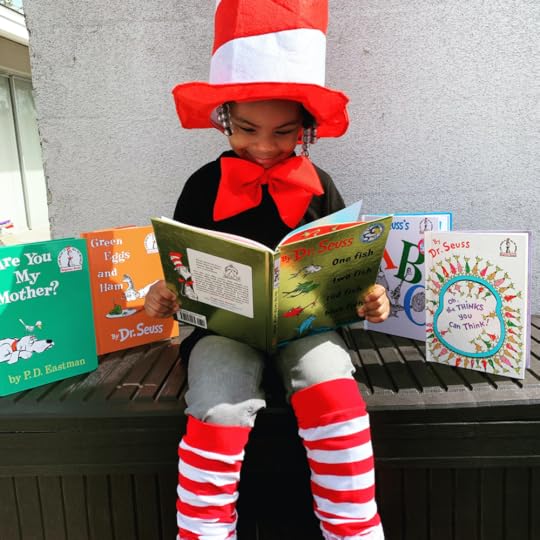
Goodreads empowers readers to personalize their reading experiences based on individual interests, preferences, and goals.
Whether you're interested in following specific genres, exploring niche topics, or discovering books recommended by friends or influencers, Goodreads provides customizable features to curate your reading list accordingly.
The platform's personalized recommendations, based on your reading history and ratings, help you discover books that resonate with your unique tastes and aspirations.
By engaging actively with Goodreads features such as book quizzes, themed book lists, and seasonal reading challenges, you can tailor your reading journey and to read list to align with your evolving interests and aspirations, ensuring that each book you choose enriches your literary experience in meaningful ways.
Goodreads continues to evolve as a dynamic platform that enriches the reading experience more readers, fosters community engagement, and promotes a love of literature across diverse audiences.
Whether you're a casual reader or a dedicated bibliophile, Goodreads offers invaluable tools and resources to support your literary journey and connect you with a global community of fellow book enthusiasts.

In conclusion, Goodreads is a valuable resource for readers seeking to expand their literary horizons, discover new books and authors, engage in community discussions, and track their reading progress.
By leveraging the site and its recommendation system, participating in community activities, connecting with authors, utilizing reviews and recommendations, setting reading challenges, and setting goals, you can maximize your reading experience and immerse yourself in a world of literary exploration.
Whether you're passionate about fiction, non-fiction, classics, or contemporary literature, Goodreads empowers you to connect with a global community of readers, share your love of books, and embark on a rewarding journey of literary discovery and growth.
July 18, 2024
Top Tips for Finding Engaging Historical Fiction Books
By Helena Smrcek

What is Historical Fiction?
Historical fiction is a literary genre where the story takes place in the past, typically at least 50 years before the author’s lifetime.
Historical novels capture the details of the time period as accurately as possible for authenticity.
Historical fiction can be set in any time period, from classical antiquity to World War II.
Crafting Compelling Historical Novels
Key Elements of Good Historical Fiction
Good historical fiction should immerse readers in the past, using historical details to create a vivid and believable setting.
The author should strive to create a sense of authenticity, using historical accuracy to inform the story.
Historical fiction writers blend detective work and empathy to create imagined stories within real historical contexts.

Finding Your Next Historical Fiction Read
Researching Historical Eras and Settings for Writing Historical Fiction
Choose a real person from history or an ordinary person living in extraordinary times to inspire your story.
Use letters, diaries, accounts written by others, and biographies as valuable sources to add color to your story.
Visit galleries, museums, and talk to people to get a better sense of the time period and characters.
Exploring Historical Fiction Subgenres
Historical fantasy combines historical accuracy with fantastical elements, such as magic or mythical creatures.
Alternate history explores what would have happened if historical events had unfolded differently.
Historical mystery combines historical accuracy with detective fiction, often featuring a mystery to be solved.
Historical romance combines historical accuracy with romantic fiction, often featuring a love story set in the past.

Evaluating Historical Fiction Books
Assessing Historical Accuracy in Historical Novels
Historical fiction does not have to be historically accurate, but it should strive to be plausible and authentic.
Authors should balance historical accuracy with a creative license, using their imagination to create engaging stories.
Get the broad strokes right but take creative liberties with smaller details.
Judging Character Development and Plot
Create characters that fit the era, using historical accuracy to inform their worldviews.
Use characters to explore settings, rather than prioritizing setting construction.
Remember to show both sides of history, including the perspectives of marginalized groups.
Discovering New Historical Fiction Authors
Using Book Reviews and Recommendations
Read book reviews and recommendations to find new historical fiction authors and books.
Look for books that have won awards or received critical acclaim.
Exploring Online Historical Fiction Communities
Join online forums and social media groups dedicated to historical fiction to discover new authors and books.
Participate in discussions and ask for recommendations to find your next great read.
Start Your Historical Fiction Journey
Writing historical fiction is a delicate dance between accuracy and imagination.
Start by choosing a setting and era, then conduct extensive research to create a vivid and believable world.
Remember to focus on what hasn’t changed in a historical setting, such as natural landscape features.

Finding engaging historical fiction books can be a delightful journey into different eras, cultures, real people, and perspectives.
Here are some tips to help you discover captivating historical fiction reads:
1. Explore Different Time Periods and Setting s
Historical fiction spans a wide range of time periods and settings, from ancient civilizations to recent history. Consider exploring eras that interest you personally or that align with historical events you find intriguing.
Whether it’s the Tudor era of England, World War II Europe, or ancient Egypt, each period offers unique narratives and rich historical contexts to explore.
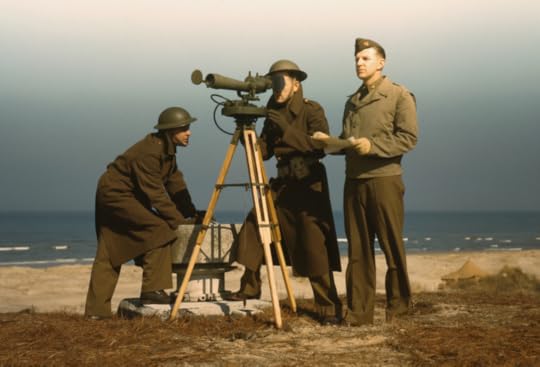
2. Research Award-Winning and Critically Acclaimed Titles
Look for books that have received awards or accolades within the historical fiction genre.
Awards like the Pulitzer Prize for Fiction, the Man Booker Prize, or historical fiction-specific awards such as the Walter Scott Prize can indicate quality storytelling and meticulous historical research.
Reading reviews and recommendations from reputable sources can also help you identify standout titles.
3. Follow Favorite Authors and Series
If you’ve enjoyed historical fiction from specific authors or series in the past, consider exploring more of their works.
Many historical fiction authors develop series that follow characters or families across multiple books, offering continuity and deeper explorations of historical events and settings.
Following authors on social media or subscribing to their newsletters can keep you informed about new releases and upcoming titles.

4. Join Online Book Communities and Forums
Engage with online book communities and forums focused on historical fiction.
Platforms like Goodreads and Reddit’s books, as well as historical fiction-specific websites often feature discussions, reading recommendations, and book clubs dedicated to the genre.
Participating in these communities allows you to interact with fellow readers, share insights, and discover hidden gems recommended by like-minded enthusiasts.
5. Explore Different Subgenres within Historical Fiction
Historical fiction encompasses a variety of subgenres, each offering unique storytelling approaches and thematic focuses.
Whether you prefer historical mysteries, romance, biographical fiction, or tales of adventure, exploring different subgenres can introduce you to diverse narrative styles and perspectives within historical settings.

6. Read Author Interviews and Historical Background
Delve into author interviews, articles, and background research related to historical events depicted in fiction.
Many authors provide insights into their research process, sources of inspiration, and the historical accuracy behind their narratives.
Understanding the historical context and factual basis of a story can enhance your appreciation of the author’s interpretation and storytelling techniques.
7. Visit Local Bookstores and Libraries
Local bookstores and libraries often curate displays and recommendations for historical fiction books.
Browsing shelves and talking to knowledgeable staff can lead to unexpected discoveries and personalized recommendations based on your reading preferences.
Independent bookstores, in particular, may offer unique selections and insights from staff passionate about historical fiction.

8. Attend Author Readings and Book Events
Keep an eye out for author readings, book signings, and literary festivals in your area or online.
These events provide opportunities to hear authors discuss their works, ask questions, and gain deeper insights into the stories behind their historical fiction.
Connecting with authors and fellow readers at these events can enrich your reading experience and inspire new discoveries.
9. Utilize Online Bookstores and Recommendation Algorithms
Online book retailers like Amazon, Barnes & Noble, and Book Depository use recommendation algorithms based on your browsing and purchase history to suggest books you may enjoy.
Explore curated lists, “Customers Also Bought” sections, and personalized recommendations to uncover new historical fiction titles aligned with your interests.

10. Embrace Diverse Perspectives and Themes
Historical fiction offers opportunities for exploring diverse perspectives, voices, and themes that may be overlooked in traditional historical narratives.
Seek out books that explore lesser-known events, marginalized communities, or unconventional protagonists to broaden your understanding of history and appreciate the richness of human experiences across different cultures and time periods.
By exploring these tips and avenues, you can cultivate a rewarding reading experience filled with engaging historical fiction that transports you to different worlds while deepening your appreciation for the complexities of ancient history and human nature.
11. Seek Recommendations from Book Bloggers and Booktubers
Book bloggers and Booktubers (YouTubers who focus on book reviews and recommendations) often specialize in specific genres, including historical fiction.
Their reviews, reading vlogs, and themed recommendation lists can provide valuable insights into new releases, underrated gems, and beloved classics within the genre.
Following book bloggers on platforms like Instagram and Twitter or subscribing to Booktube channels allows you to stay updated on the latest trends in historical fiction and discover titles that resonate with your reading preferences.
Many bloggers and Booktubers also engage with their audience through interactive features such as monthly reading challenges or themed reading months dedicated to actual historical figures or periods, offering curated reading lists and fostering community discussion around historical fiction.

12. Consider Book Awards and Historical Fiction Societies
Exploring book awards and historical fiction societies can lead to discovering acclaimed titles and authors recognized for their contributions to the genre.
Organizations like the Historical Novel Society and the Romantic Novelists’ Association offer annual awards for outstanding historical fiction across various categories, from literary fiction to genre-specific works like historical romance or mystery.
Winners and nominees of these awards write historical fiction and often represent a diverse range of storytelling styles and historical periods, providing a curated selection of high-quality reads recommended by literary experts and peers within the historical fiction community.
Following these awards and joining historical fiction societies can provide access to curated reading lists, author interviews, and opportunities to connect with fellow enthusiasts who share your passion for immersive historical storytelling.
13. Attend Literary Festivals and Virtual Author Events
Literary festivals and virtual author events provide unique opportunities to engage directly with historical fiction authors, hear them discuss their creative processes, and gain deeper insights into the historical contexts of their novels.
These events often feature panels, readings, and discussions centered on historical fiction, allowing you to discover new authors and gain firsthand knowledge about their inspiration and research methods.
Whether attending in person or virtually, participating in these events fosters connections with authors and fellow readers who share your enthusiasm for these historical characters and narratives.
It also offers a chance to ask questions, explore thematic elements in depth, and develop a deeper appreciation for the intricacies of historical storytelling.

14. Explore Anthologies and Short Stories in Historical Settings
Besides full-length novels, exploring anthologies and short story collections set in historical settings can offer varied and concise glimpses into different time periods and themes.
Anthologies often feature contributions from multiple authors, each bringing their unique perspectives and storytelling styles to brief yet impactful narratives.
These collections may focus on specific historical figures, events, regions, or cultural perspectives, providing a mosaic of experiences that highlight the diversity and richness of historical fiction.
Short stories, on the other hand, offer concise explorations of characters, settings, and themes within a historical framework, making them ideal for readers seeking immersive experiences in a shorter format.
Exploring anthologies and short stories allows you to sample different authors and historical periods, uncovering hidden gems and discovering new favorites while enjoying the versatility and depth that historical fiction has to offer.

By incorporating these additional strategies into your search for engaging historical fiction books, you can expand your reading horizons, discover compelling narratives from diverse perspectives, and enrich your appreciation for the intricacies of history brought to life through captivating storytelling.
Whether you’re drawn to sweeping epics set in distant eras or intimate character-driven dramas of everyday life, exploring the breadth and depth of historical fiction offers endless opportunities to embark on literary journeys that resonate with the past while illuminating timeless themes and human experiences.
#writing #helenasmrcek #writeyounovel #novelist #read #books
July 16, 2024
How to Become a Beta Reader and Support Your Favorite Author
By Helena Smrcek
Have you heard people talking about beta readers and wondered what that means? Are you wondering how to become a beta reader? Have questions about how to support your favorite author? In this blog post we will explore ways how to become a beta reader and support your favorite author in a few simple steps.

Beta reading is a crucial step in the writing process where an author shares their manuscript with a reader to get feedback on the story, characters, pacing, plot, and more.
Beta readers provide valuable feedback to help authors identify strengths, weaknesses, plot holes, inconsistencies, or anachronisms that distract from their book.
Beta reading helps authors refine their work, making it more engaging and error-free.
It’s an essential step in the publishing process, allowing authors to get feedback from readers before the book is published.

Beta reading can help you improve your own writing by teaching you how to read like a writer.
You’ll learn to identify when a character arc feels unsatisfying or when there isn’t enough tension to carry an ending successfully.
You’ll start developing an inner sense for the sort of solutions you might apply to your own work.
As a beta reader, it’s essential to read books in a genre you know and like.
This helps you to provide complete and accurate feedback on the book.
To be a good beta reader, you need to develop your critical thinking and feedback skills.
Practice providing constructive criticism that is specific and honest.

Reach out to authors you love and offer your services as a beta reader.
Join writing communities, online forums, and social media groups to connect with authors looking for beta readers.
Use online platforms and beta reading services to find authors looking for beta readers.
Join beta reader directories, writing groups, and online communities to connect with authors.

Take notes while reading the manuscript, including page numbers and specific observations.
Use a separate Word doc or Google Doc to provide feedback.
Point out any overarching problems that affect the entire novel (macro feedback).
Comment on specific sentences or minor plot points that could be improved (micro feedback).

Establish clear expectations with authors on what kind of feedback they’re looking for.
Showcase your skills and experience as a beta reader to attract authors.
Develop a professional online presence, including a website or social media profile.
Highlight your experience, skills, and genres you’re willing to read.

Supporting your favorite author and becoming a beta reader are valuable ways to contribute to the literary community and help authors refine their work before publication. Here’s how you can support authors and potentially become a great beta reader yourself:
1. Purchase Their Books: One of the most direct ways to support an author is by purchasing their books. Whether it’s their latest release or previous works, buying their books not only supports their income but also boosts their visibility and success in the industry.
2. Leave Reviews: Reviews are crucial for authors as they influence book sales and rankings. After reading a book, leave a helpful review on platforms like Amazon, Goodreads, or personal blogs. Reviews provide social proof and help other readers discover the author’s work.
3. Recommend to Others: Spread the word about your favorite author’s books. Recommend them to friends, family, and book clubs, both online and offline. Word-of-mouth recommendations are powerful and can significantly impact an author’s reach and reader base.
4. Engage on Social Media: Follow the author on social media platforms and engage with their posts. Like, comment, and share their every post, updates, announcements, and content related to their books. Social media engagement helps increase their visibility and build a supportive community of readers.

5. Attend Events and Signings: Attend book signings, author talks, or virtual events featuring your favorite author. Participate in Q&A sessions, get your books signed, and show your appreciation for their work in person or online.
6. Participate in Book Launch Campaigns: During book launches, authors often run campaigns or promotions to increase visibility and reach their readers. Participate in these campaigns by sharing pre-order links, joining launch teams, or contributing to promotional activities such as blog tours, social media blitzes, or virtual launch parties. Your active participation amplifies the author’s reach and encourages others to discover and support their work.
7. Engage in Author’s Patreon or Crowdfunding Campaigns: Some authors utilize platforms like Patreon or crowdfunding campaigns to fund their writing projects or offer exclusive content to supporters. Consider becoming a patron or supporting their crowdfunding efforts if the author provides value or perks that align with your interests. Your financial support directly contributes to the author’s own creative writing endeavors and helps sustain their writing career.
8. Join and Support Author Communities: Authors often participate in online communities, forums, or writing groups. Join these communities to connect with authors, discuss their works, and participate in discussions related to writing and literature. Engaging in these communities not only supports authors directly but also fosters a sense of camaraderie among fellow readers and other writers, who share a passion for storytelling.

1. Follow the Author’s Website or Social Media: Authors often announce opportunities for beta readers on their websites or social media. Follow them closely to stay updated on any calls for beta readers or opportunities for beta readers to participate in early reading and feedback sessions.
2. Express Your Interest: If you’re a dedicated reader and admirer of an author’s work, express your interest in becoming a beta reader. Send a polite and enthusiastic message through their website contact form or social media channels, outlining why you’re interested and what you can offer as a beta reader (e.g., constructive and helpful feedback, attention to detail).
3. Be Reliable and Professional: Authors rely on beta readers to provide honest and constructive feedback on their manuscripts. If selected as a beta reader, take your role seriously. Read the manuscript thoroughly, take notes on plot, characters, pacing, and overall impressions, and provide feedback in a timely manner according to the author and best beta reader’s guidelines.

4. Respect Confidentiality and Guidelines: Beta reading often involves reading unpublished written works that are still in development. Respect the author’s confidentiality agreements and guidelines regarding sharing or discussing the manuscript content with others. Maintain professionalism and integrity in handling sensitive or embargoed material.
5. Provide Thoughtful Feedback: Offer feedback that is constructive, specific, and respectful. Focus honest feedback on areas where the manuscript could be strengthened or clarified, rather than personal preferences or opinions. Highlight both strengths and areas for improvement to help the author polish their work before publication.
6. Hone Your Feedback Skills: Effective beta reading requires the ability to provide insightful and actionable feedback. Hone your feedback skills by practicing constructive criticism respectfully. Focus on elements such as plot consistency, character development, pacing, and narrative flow. Develop a keen eye for detail and the ability to write well to articulate your thoughts clearly to help authors improve their manuscripts.
7. Build Trust and Professionalism: As a potential beta reader, building trust and demonstrating professionalism is essential. Respect the author’s creative vision and confidentiality agreements regarding their work in progress. Communicate openly and transparently about your availability, timeline for feedback, and any potential conflicts of interest. Establishing a professional rapport with authors enhances your credibility as a trusted beta reader and increases the likelihood of future collaborations.

8. Network and Seek Opportunities:
Expand your network within the literary community to discover more opportunities for your beta reading service.
Attend writing conferences, join online forums or groups dedicated to beta reading, and connect with authors, editors, and literary agents. Networking increases your visibility as a beta reader and opens doors to new partnerships and collaborations within the publishing industry.

By actively supporting your favorite author through various channels and offering valuable feedback as a beta reader, you contribute to their success and growth as a writer.
Your commitment to their work fosters a mutually beneficial relationship built on trust, respect, and shared enthusiasm for storytelling
Together, authors and many beta readers form a dynamic partnership that celebrates creativity, fosters literary excellence, and enriches the cultural landscape of literature.
By supporting your favorite author through purchasing their books, leaving reviews, and engaging with their writing community, and by expressing interest in becoming a beta reader and providing valuable feedback, you can play a significant role in their literary journey.
Your support not only helps authors succeed but also enriches the reading experience for fellow fans and contributes to the vibrant ecosystem of literature.
Thinking of becoming my beta reader? Please email me at helen@helenasmrcek.com for more inforamation.
July 11, 2024
Welcome to the Disaster Zone: My Worst Book Club Experience Ever
By Helena Smrcek
Today, I bring you the tragicomic saga of my plunge into the abyss of what could only be described as the worst book club experience in the history of book clubs. Buckle up, because this journey is fraught with cat hair, phobias, and a pinch of awkward feminism.

Let’s set the scene.
One sunny February afternoon, while waiting in front of my kid’s school for the bell to ring, I struck up a casual conversation with another mom. We seemed to hit it off, and she invited me to her book club. The book the group was reading was J. K. Rowling’s Casual Vacancy. I was thrilled.
The next day, I stopped at a bookstore and bought the hard cover, eager to dive in right after the kids were tucked in. Three pages in, I knew I was in trouble. This wasn’t anything like Harry Potter, and nothing I would ever pick of my volition.

I won’t turn this blog post into a book review, but let’s just say, it took a major commitment for me to plow through the chapters. I was the wrong audience for this novel.
During those days, I felt an obligation to finish every book I started. Let’s just say I have matured since. I put myself under so much pressure to continue reading, as the book club meeting date was getting closer, I felt anxious every time I glimpsed the cover.

On the Book Club Sunday
I had to go to work right after church. A large group booked my pottery studio the night before and all their projects needed to be glazed. My staff was very busy hosting several birthday parties, so I told them I would drop by and take care of the glazing.
Let me just say there was a lot more stuff to take care of than I expected. I ran out of time and had to message my friend that not only I would be late for the meeting but would also come wearing my work close. Was that okay? I was assured that would be no problem.
When I finally walked through her front door and entered the living room, I paused. Imagine a circle of women, dressed for an evening out, sitting in a quaint room straight out of a cat lover’s paradise.

I Love Cats
But this was another level. Everywhere I turned, there were mountains of cat hair. And when I say everywhere, I mean everywhere. It clung to the furniture, my clothes, and even to my Ritz cracker. My eyes watered and the allergies kicked in.
Now, I’m not one to judge pet preferences, but imagine my dismay when I realized there were pet rats in cages stacked along one of the living room walls. Yes, rats. Caged, thank goodness, but still... rats.
Did I mention I have a debilitating fear of rodents? It was like a personal nightmare come to life, surrounded by twitching whiskers and beady eyes while my friend rattled off their names and favorite things to do. I silently wondered if the next thing on the list would be an introduction to a giant anaconda. You see, snakes and I also don’t play well.

I Can Do This
Mildly traumatized, I sat on the hairy sofa, thinking that my glaze splattered jeans were actually the most suitable attire for this event. And then I wondered how I would explain that I didn’t even finish the book we were about to discuss. I struggled past half, but as I drudged through pages describing teenage body functions and places I’d rather never visit, I came to a full stop.
Feeling like a complete failure, I declined the offered coffee and looked around the room. Our hostess introduced each of her friends and we exchanged polite smiles. The chatter went on, leaving me to wonder at what point would I be able to express my struggle with the pages? How would I disclose the awful truth that, for the first time in my adult life, I couldn’t endure the remaining chapters?
Then Again, Maybe I Can't
I checked my phone, then tuned into their discussion. And what a discussion it was. The conversation somehow veered to a nostalgic dive into their first boyfriends and teen exploits–in a bedroom. I was horrified. Checking my phone again, I wondered if it would be rude to fake an emergency and leave.

I took a deep breath, choked on cat hair, and told myself I could do this. As intriguing as it was to learn about someone’s first fling at fourteen, I couldn’t help but wonder if we were all collectively avoiding the literary elephant in the room.
Then came the pièce de résistance: the discussion about birth control, and feminism. A question was asked:
“Do our girls have an adequate appreciation for what the feminist movement had done for them?”
I couldn’t hold my tongue any longer.
“Of course they don’t.” I blurted out.
All eyes were instantly on me.
“How could they. They have no idea what women had to deal with only a few decades ago.” And then I simply asked. “Are we going to discuss the book anytime soon? I have to make dinner.”
There was a bit of uncomfortable shifting in the seats, followed by a few strained smiles.
“We have already discussed the book. Before you got here,” the hostess informed me.
In fifteen minutes? I must have frowned, because she immediately followed with,
“But why don’t you share your thoughts?”

So, I did. Confessing the disappointment in my inability to finish this literary work. Stating that I was puzzled, why would this amazing author venture into writing this book in a first place? She was a hero to my children, who grew up reading her novels and loved Harry Potter.
All I got were icy stares. And then I understood I have unknowingly entered the wrong camp.
The discussion quickly turned toward ‘the rich’, which I was presumably part of, as I owned my own business and drove a German car.
With the last bits of my courage, I pointed out that J.K. Rawling is not exactly poor.
I was reminded of her back story, which I personally find fascinating, but at that point I had decided to hold my peace.
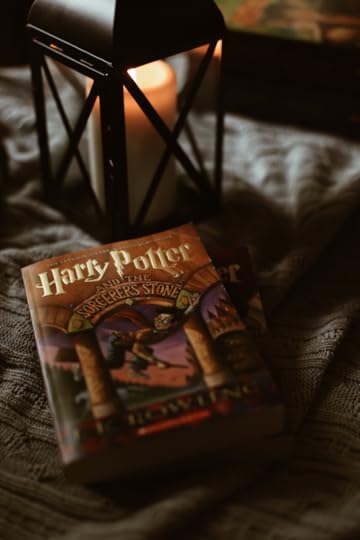
I examined a piece of cheddar laid out on the cheese platter. Not seeing any hair, I bravely picked it up and ate it, mainly to prevent myself from speaking.
As our afternoon neared supper hour, I decided it was high time for me to exit. I thanked everyone for including me in the meeting. I must have made an impression, because as I was about to exit the front door, I was invited to a sleepover to celebrate International Women’s Day. I bit my tongue. Obviously, none of these women knew my back story.
As the hostess walked me to my car, she assured me that she would text me with the date for the next book club meeting. Thankfully, I have never received that message.

So, dear readers, if you ever find yourself invited to a book club that promises excitement but delivers chaos, heed my warning: beware the cat hair, brace yourself for the unexpected pet choices, and for the love of all things readable, check the book selection beforehand.
Until next time, may your books be engaging, your discussions coherent, and your furniture blissfully free of fur. Stay literate, my friends. Click the link to get your free Tips Sheet for Starting and Sustaining a Book Club.



